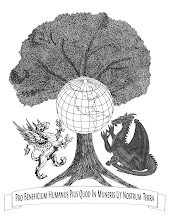This article from John Elkington and the Guardian raises a fantastic question about the future of leadership in the Sustainability Movement.
After reading Paul Hawken's take on this subject from his book Blessed Unrest, I'm excited and also concerned about his conclusions. Hawken, who has tremendous admiration from this author, makes the case that the Social Justice and environmental movements are huge, yet go largely unremarked in mainstream press because of their decentralization. And, yes, in our opinion that is a good thing. For now.
Hawken compares these movements to the anti-body and immune system responses of the human body: ubiquitous, essential and effective. He also acknowledges that "this immune system" had depressed response times and other impacts that were initially slow moving due to flaw in human psychology and disconnects in awareness that are since being cured by information and communication technologies.
He celebrates these facts and observes that the rate of escalation should hopefully lead to a substantial enough critical mass of citizen based, grass roots action, for there to be geometric or exponential impacts on climate, food and social justice matters. I agree to a certain extent.
I disagree that we have time for the organic nature of these activities to escalate to providing exponential returns, largely because the negative factors on all these issues are already spiraling in complexity at exponential rates. It does only minimal good to rely on the "immune system" to cure and heal a "patient that has multiple gunshot wounds." And let's be very clear that our planet and its inhabitants are victims of "multiple self inflicted gunshot wounds."
Which leads me back to John Elkington and his Guardian Piece. It has sparked great conversation in the world of sustainability practitioners.
From a philosophical standpoint, there is certainly a solid basis to suggest that there should be/can be a single mental, emotional, spiritual and strategic leader/tour de force on behalf of 3X bottom line economics and sustainability in socio-economics, geo-politics, global stewardship, jurisprudence etc. Think Hawken-esque.
That isn't the hard part. All great social movements of the last 400 hundred years have had such leaders. Although we have entered the age of crowd sourcing and collaborative decision making, people still are conditioned to need someone/something through which they can crystalize their focus, both positively and negatively.
This is one of the many reasons why we have representative democracy versus direct democracy.
Nominating a candidate for this purpose now is counterproductive, however, largely because of the lack of architecture, limits to capital access, mis-organization, hyper-fragmentation, poor message clarity, insufficient message deployment, poor message efficacy, lack of macro strategic planning, etc as these apply to a global, regional, sovereign, regional domestic and local level initiatives on sustainability and other related topics.
High level leadership is irrelevant if there is no organized support structure capable of interfacing with that leadership.
We have leaders on climate issues, on social justice advocacy, on species depletion, etc... but they are silo'ed and present significant but small pieces of a much larger global architectural and functional overhaul.
Electing one of these folks, from one of these constituent bases, even hypothetically, will do a greater disservice to the whole. Someone, other than our current leaders, with greater potential aptitude and amplitude is required, and yes, necessary.
For example, Former VP Gore is a wonderful person, a true climate champion and a personage worthy of respect and the station he has attained. But in my view, Bill Gates did more to clearly and compellingly define the climate discussion for a wider audience, through his 28 min TED talk "Innovating to Zero", than Mr. Gore has through several books, appearances, speeches, etc.
Why? Because Gates made it a pragmatic, simple, pro-business based, non-partisan, calculated, elegant equation - understandable to everyone and anyone regardless of views, access, nationality, economic station or voice. This is true even when you disregard his taking the TED Talk and using it as an obvious pitch for his atomic energy initiatives with Intellectual Ventures.
Our next leader MUST have this ability to drive both core simplicity and direct action in all facets independently and interdependently as her/his central attribute. In an age of hyper-specialization, we need a multi-faceted leader.
Just as life is an over-reigning constant changing in degree of variety and multiplicity based on a series of factors, so too is centralized leadership a mutable and essential constant to the success of movements and organizations. This is true specifically when movements and organizations are advancing the sustainable stewardship of life and ecosystems. It is it's own virtuous cycle.
Subscribe to:
Post Comments (Atom)

No comments:
Post a Comment